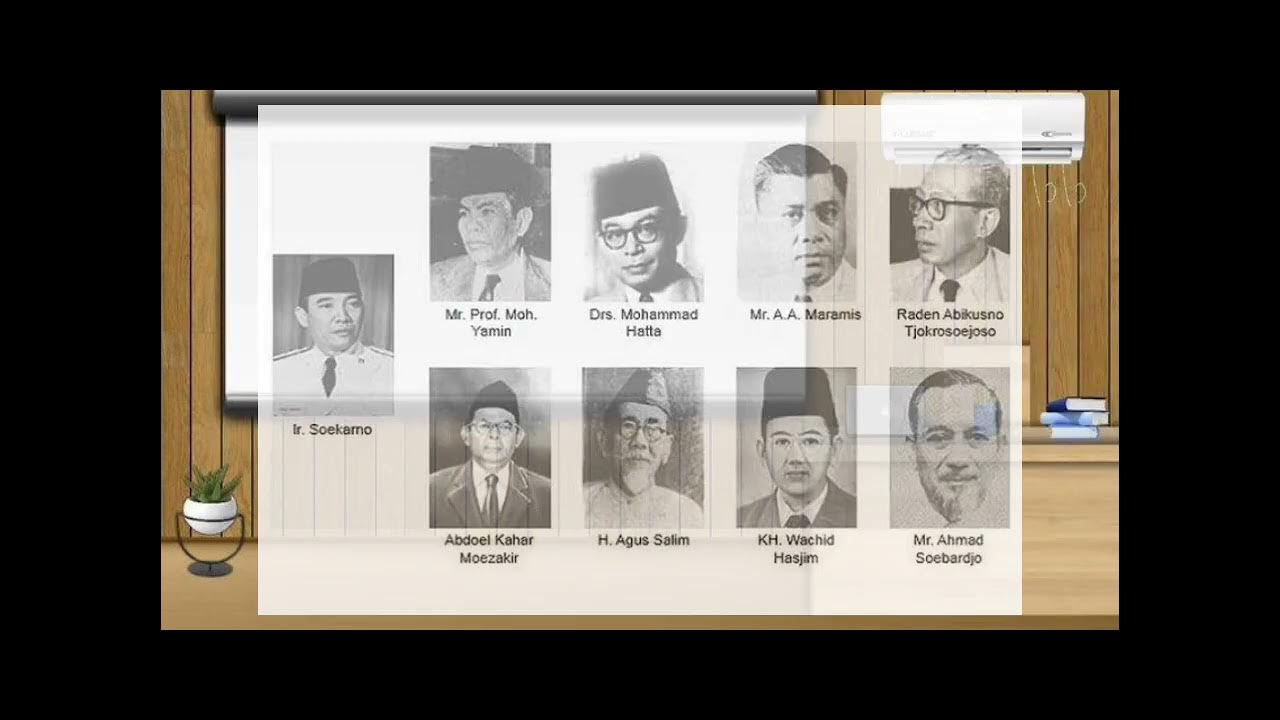Materi Pokok Pokok Pikiran Pancasila
Summary
TLDRThis speech delves into the essence of Pancasila, Indonesia's state ideology, emphasizing its dual aspects: as a text, the official formulation ratified in 1945, and as a context, the values that have evolved throughout Indonesia's history. The speaker outlines three dimensions of Pancasila: belief, knowledge, and exemplary behavior, which interlink to form a cohesive framework. Key contributors to its ideology, including Bung Hatta, Bung Karno, and Ki Hajar Dewantoro, are highlighted. The speech stresses Pancasila’s role as a guiding moral and ethical force, rooted in religion and local traditions, essential for Indonesia's unity and progress.
Takeaways
- 😀 Pancasila consists of two aspects: the text form (the official principles) and the context (the values that have developed in Indonesian history).
- 😀 The key components of Pancasila ideology are belief, knowledge, and exemplary behavior, which reinforce each other.
- 😀 The first principle of Pancasila is 'Belief in the One and Only God,' which serves as the moral and ethical foundation of the nation.
- 😀 Bung Karno emphasized that the value of nationality is crucial in uniting Indonesia's diverse ethnic, religious, and cultural groups.
- 😀 Ki Hajar Dewantoro highlighted the importance of universal humanity as a driving force behind progress and civilization.
- 😀 Pancasila must be transmitted with a sense of belief, making it a unifying and dogmatic ideology for the Indonesian people.
- 😀 Pancasila also serves as a scientific paradigm, encouraging the development of new theories based on its values, across all fields of science.
- 😀 The third dimension of Pancasila is the need for exemplary behavior, where the principles of belief and knowledge must be acted upon through virtuous actions.
- 😀 Pancasila should not only be viewed as a theoretical ideology but as a guiding ethical and moral framework that influences the behavior of Indonesian citizens.
- 😀 The integration of Pancasila’s principles must focus on both collective belief and practical application, ensuring they complement each other to strengthen the nation.
- 😀 The Indonesian archipelago's religious and local wisdom traditions have shaped the ethical foundation of Pancasila, influencing the country's values and virtues.
Q & A
What is the significance of Pancasila in Indonesia?
-Pancasila is the foundational philosophy of Indonesia, embodying the nation's core values and principles. It serves as both the ideological basis and the moral compass for the country's development and unity, integrating religious, national, and humanistic values.
What are the two main aspects of Pancasila?
-The two main aspects of Pancasila are: Pancasila as a text, which is the official formulation of the five principles ratified in 1945, and Pancasila as a context, which represents the values that have evolved in Indonesia’s national history.
What are the five principles of Pancasila as outlined in the text?
-The five principles of Pancasila are: 1) Belief in the One and Only God, 2) Just and civilized humanity, 3) The unity of Indonesia, 4) Democracy led by wisdom through deliberation and representation, and 5) Social justice for all of Indonesia.
How does Pancasila serve as an ideology?
-Pancasila serves as an ideology with three dimensions: belief, knowledge, and exemplary behavior. These dimensions ensure that Pancasila is not only a theoretical framework but also a practical guide for national progress and ethical conduct.
What is the belief dimension of Pancasila?
-The belief dimension of Pancasila emphasizes that every Indonesian citizen should believe in Pancasila as the most appropriate and unifying ideology for the nation. It stresses the importance of maintaining this belief as a bond for national solidarity.
What role does the knowledge dimension of Pancasila play?
-The knowledge dimension of Pancasila positions it as a scientific paradigm that can guide the nation’s progress, particularly in science, technology, and intellectual development. It serves as a foundation for theorizing new scientific and philosophical concepts based on Pancasila's values.
Why is exemplary behavior important in Pancasila?
-Exemplary behavior is essential because it ensures that the belief and knowledge dimensions of Pancasila are not merely theoretical but are put into action. It emphasizes ethical virtues and moral conduct, guiding individuals and society to live according to the principles of Pancasila.
Who were the key founding figures of Pancasila, and what were their contributions?
-The three key founding figures of Pancasila are: 1) Bung Hatta, who emphasized belief in the One and Only God as the moral basis, 2) Bung Karno, who focused on human values and national unity, and 3) Ki Hajar Dewantoro, who advocated for universal humanity as the core of Pancasila.
How are the three dimensions of Pancasila interconnected?
-The three dimensions—belief, knowledge, and exemplary behavior—are interconnected and reinforce each other. For instance, belief in Pancasila supports the scientific knowledge derived from it, while knowledge in turn strengthens the ethical and exemplary behavior expected of citizens.
Why is Pancasila considered to have a doctrinal or dogmatic aspect?
-Pancasila has a doctrinal or dogmatic aspect because it requires indoctrination to transmit its noble values effectively. To maintain its integrity and ensure its acceptance across generations, it must be presented as a doctrine that people believe to be true and just.
Outlines

This section is available to paid users only. Please upgrade to access this part.
Upgrade NowMindmap

This section is available to paid users only. Please upgrade to access this part.
Upgrade NowKeywords

This section is available to paid users only. Please upgrade to access this part.
Upgrade NowHighlights

This section is available to paid users only. Please upgrade to access this part.
Upgrade NowTranscripts

This section is available to paid users only. Please upgrade to access this part.
Upgrade NowBrowse More Related Video

Analisis Sosial Sejarah Perumusan Pancasila

Materi Pendidikan Pancasila Kelas X "Perumusan Pancasila sebagai Dasar Negara"

SEJARAH LAHIRNYA PANCASILA

RANGKUMAN MATERI PPKN BAB 1 UNTUK KELAS 7 SMP KURIKULUM MERDEKA SESUAI CP TERBARU!

Pancasila Sebagai Ideologi Nasional

Hubungan Pancasila dengan proklamasi dan Pembukaan UUD 1945
5.0 / 5 (0 votes)